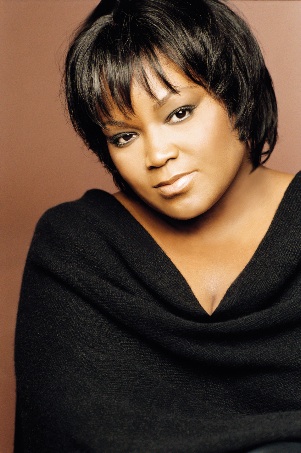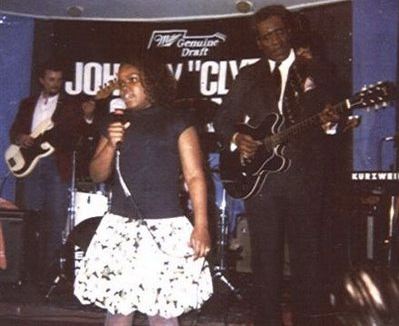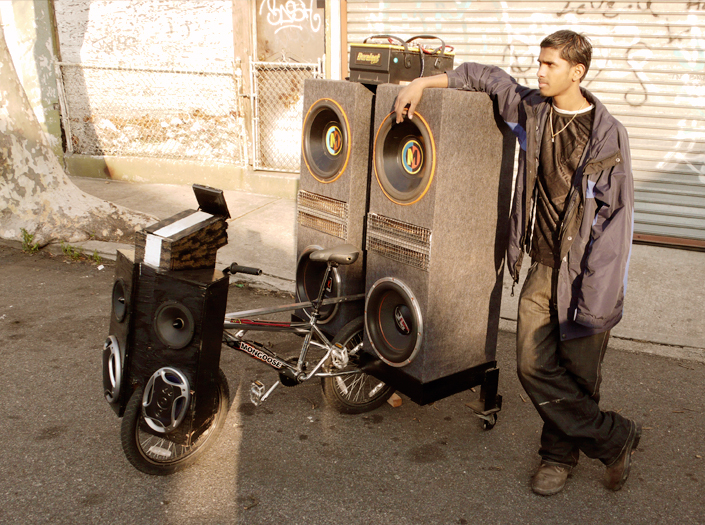
Copeland: Baby’s got belting power. Photo by Carol Friedman
 Harlem native Shemekia Copeland has been making a name for herself as a singer of gutsy, earbusting Black music since childhood. Born into blues royalty, the daughter of now deceased Texas blues guitar legend Johnny Clyde Copeland, she’d often accompany her dad onto the stand, right, where she’d wow audiences with a voice womanly beyond her years.
Harlem native Shemekia Copeland has been making a name for herself as a singer of gutsy, earbusting Black music since childhood. Born into blues royalty, the daughter of now deceased Texas blues guitar legend Johnny Clyde Copeland, she’d often accompany her dad onto the stand, right, where she’d wow audiences with a voice womanly beyond her years.
She’s still doing it. Though not yet 30, Copeland sings songs full of the attitude, soul-weariness, and hard-earned wisdom that is the hallmark of her trade. On her new album, Never Going Back, songs such as “Sounds Like the Devil,” “Rise Up,” and “Limousine” portray a woman beset with calamity, but facing it undaunted; tired and often demoralized, certainly, but absolutely not giving up.
Shemekia Copeland is a guest today on my WBAI-NY / 99.5 FM radio show, NONFICTION, this afternoon, Friday, January 23, at 2 pm ET.
 Then, Joe Stevens, half of the transatlantic directing team Randall Stevens with Nicolas Randal, will talk about their 2008 short, Made in Queens. The film documents a group of Trinidadian-Tobagonian youth living in said borough who, as a hobby, build “enormous stereo systems jury rigged onto ordinary BMX bikes.”
Then, Joe Stevens, half of the transatlantic directing team Randall Stevens with Nicolas Randal, will talk about their 2008 short, Made in Queens. The film documents a group of Trinidadian-Tobagonian youth living in said borough who, as a hobby, build “enormous stereo systems jury rigged onto ordinary BMX bikes.”
The gargantuan “Basszilla,” above, posed with its creator, crew leader Nicholas Ragbir, features
Four 16 volt car batteries powering four 15” bass speakers in back, two 6.5” mids over two 6×9” mids up front. Two 3000 watt bass amps and one 2000 watt mids amp. DVD touch screen with navigation and music equalizer. 22 tooth chainring. Heavy duty chain, rims, tires and custom-welded support brackets.
Made In Queens is screening tomorrow at the Queens Museum of Art, as part of the Queens International 4 exhibition (January 24 – April 26). “Rumor has it,” says Joe, “the crew and a couple of the bikes may even be on hand.” Hopefully they’ll find parking.
 Then, Barack Obama’s inaugural address on Tuesday has been widely hailed by people of every stripe, and on every side of the political spectrum. In The New York Times, Gordon Stewart, a speechwriter for President Jimmy Carter, said the address was filled with “fine language” and “thrilling sentiments.” Meanwhile, Clark S. Judge, a speechwriter for President Ronald Reagan, called it a “marvelous,” “deeply American” speech.
Then, Barack Obama’s inaugural address on Tuesday has been widely hailed by people of every stripe, and on every side of the political spectrum. In The New York Times, Gordon Stewart, a speechwriter for President Jimmy Carter, said the address was filled with “fine language” and “thrilling sentiments.” Meanwhile, Clark S. Judge, a speechwriter for President Ronald Reagan, called it a “marvelous,” “deeply American” speech.
But was it? Wouldn’t that depend on what vision one has of America?
Ronald Takaki, emeritus professor of ethnic studies at the University of California, Berkeley, and author of the book A Different Mirror: A History of Multicultural America, above, believes that Obama’s speech rendered a picture of America that, though inspiring to some, leaves out far too many Americans.
You can hear Shemekia Copeland, Joe Stevens, and Ronald Takaki by tuning in at 2 pm. If you’re outside of the New York tri-state, check out our stream on the web. If you miss the live show, dig into our archives for up to 90 days after broadcast.

2 comments ↓
I’ll be on the road during this broadcast but I will hit up the archives. I can’t wait to hear this and I really like Dr. Takaki…and he’s probably right, even though I do think the speech was a fine speech, even with MY view of America.
Electric Avenue’s playlist is the best!
Leave a Comment